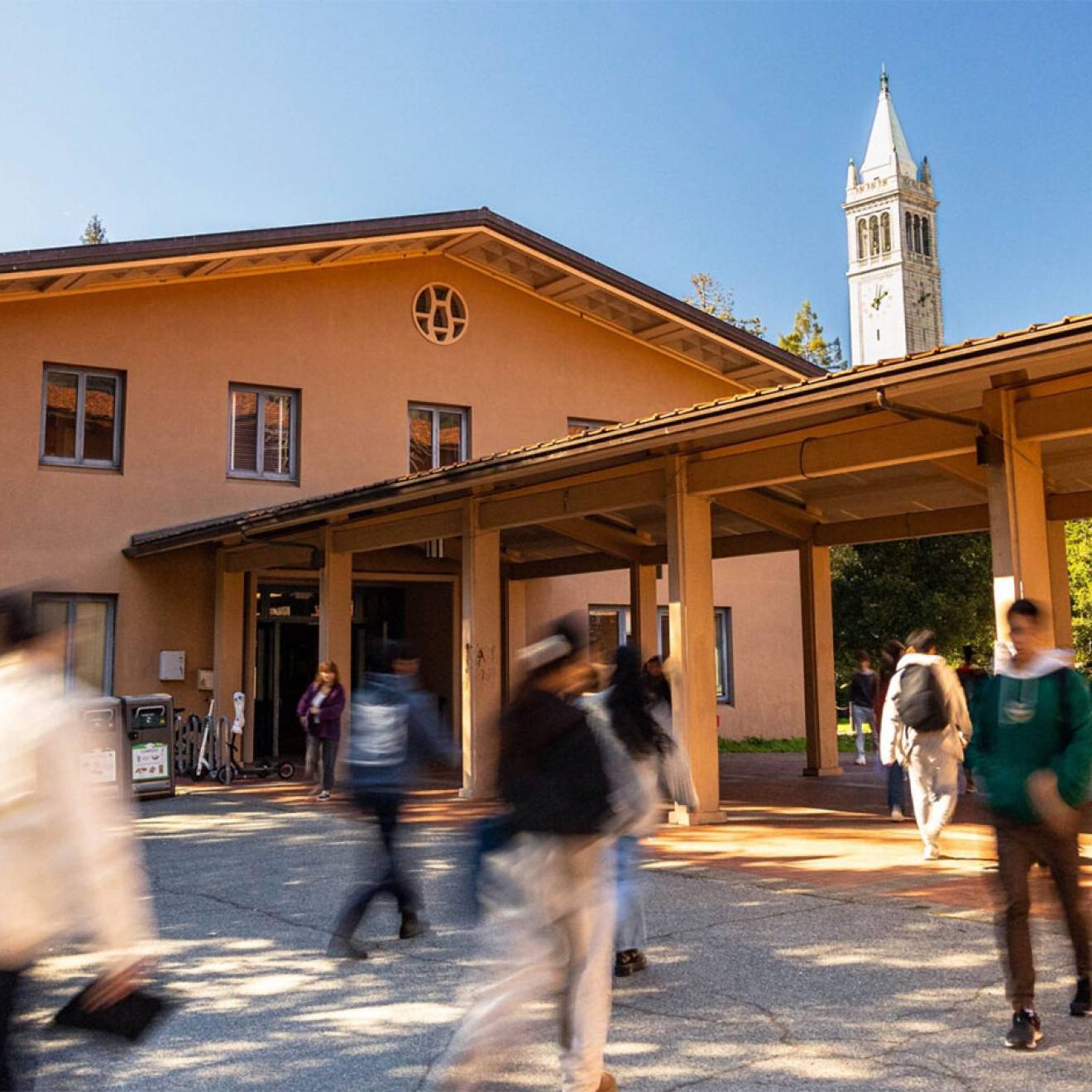Xochitl Rojas-Rocha, UC San Diego
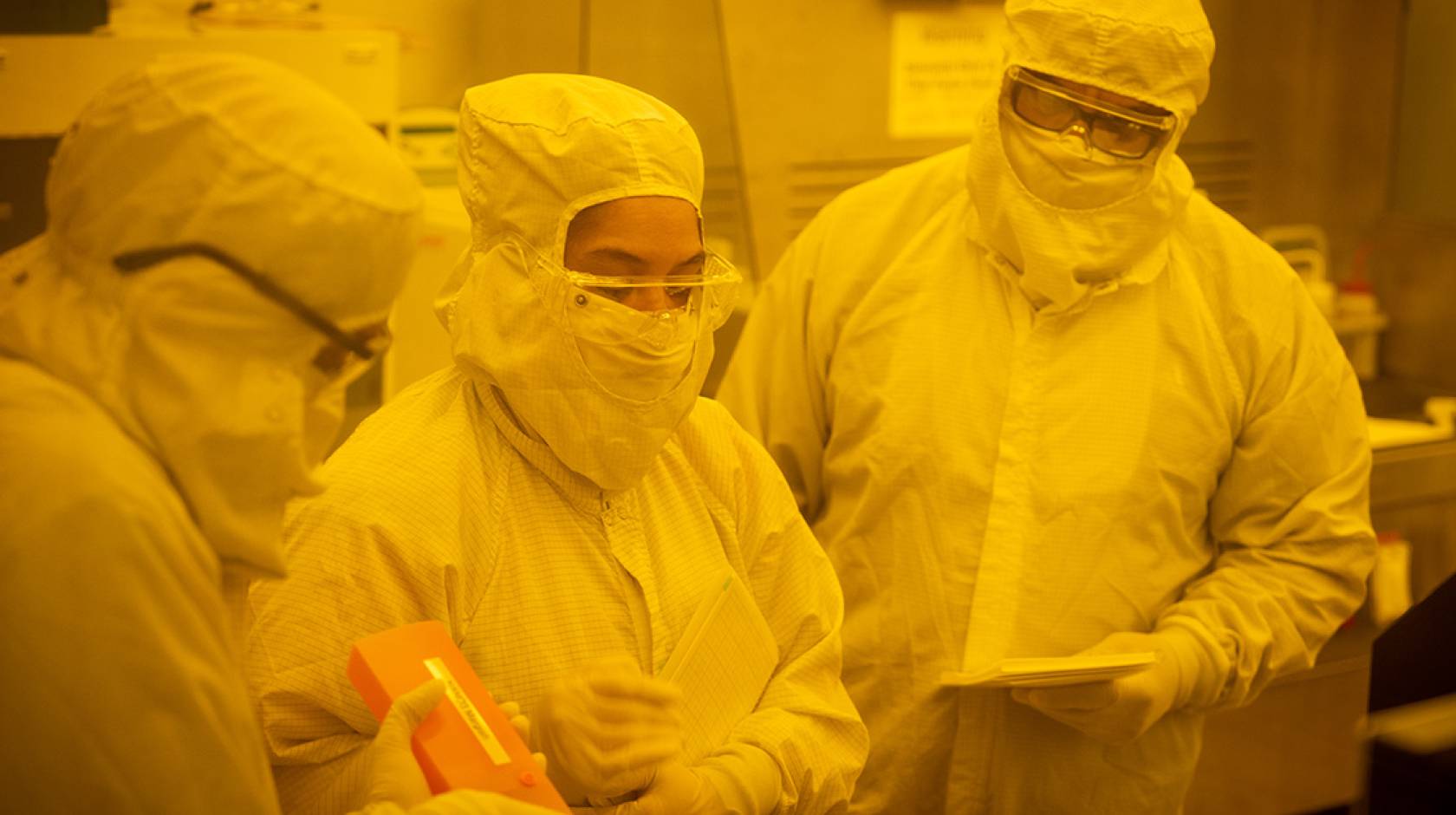
The UC San Diego Qualcomm Institute’s (QI) Nano3 facility recently received $437,000 from the National Science Foundation (NSF) to establish a nanotechnology workforce training program for veterans.
The program is part of a national consortium that teaches participants fundamental skills in microelectronics and nanomanufacturing to advance their careers. Currently, Nano3—named for its integration of nanoscience, nanoengineering and nanomedicine—is training its first cohort. All trainees were recruited through a partnership with Southwestern College in Chula Vista, California.
“This is a matter of respecting veterans and offering them a chance at a better life,” said QI Program Manager for Education and Outreach Programs Yves Theriault. “We want to help veterans become more competitive in the marketplace."
The veterans’ program complements other workforce training programs offered by Nano3 for San Diego undergraduates and local high school and middle school teachers. QI also offers a variety of other workforce training opportunities funded by the State of California.
Creating an Environment for Learning
The Microelectronics and Nanomanufacturing for Veterans Consortium was established last fall through a $4.6 million grant from the NSF to the consortium’s lead, Pennsylvania State University (Penn State), with nine academic partners.
At Nano3, trainees can access the types of industry- and research-grade nanofabrication and characterization instruments that professionals use to create the building blocks of everyday devices, including those in communications, energy, medical diagnostics, genomics and other applications.
As part of the program, trainees tune into remote lectures from Penn State researchers before reinforcing and expanding what they’ve learned in the laboratory. Their progress is overseen by UC San Diego undergraduate interns, some of whom have worked with Nano3 for years. The exchange gives interns the chance to adopt new roles as teaching assistants, while cementing their knowledge of the instruments.
“Southwestern College has a long history of helping veteran students achieve their educational and professional goals by offering them comprehensive academic, counseling and support services,” said Juan Gonzalez-Gonzalez, professor of chemistry and co-principal investigator on the Southwestern College team. “Through this grant, our goal is to provide our military-affiliated students with an expedient and viable pathway to a great career in a high-tech industry with the prospect of economic mobility.”
Upon completion of the program, the participants can apply for ASTM International (formerly known as American Society for Testing and Materials) certification.
‘This Industry is Going to be Booming’
Although the trainees share some common history, their reasons for joining the program vary. Marlon Mendoza, a U.S. Navy veteran and engineering major at Southwestern College, found his drive during the 2020 COVID-19 lockdown. He needed something new, and engineering translated well from his experience as an aviation technician with the Navy.
Like many of his fellow trainees, Mendoza heard about the Nano3 program through one of his classes at Southwestern. Thus far, he says he’s benefited from the explicit connections between the course and lab work, and the opportunity to learn skills in demand by industry. The program invites speakers from nine different companies, including SEMI North America, MICRON Technology, Tokyo Electron and others, to offer direct feedback on what it takes to secure entry level positions.
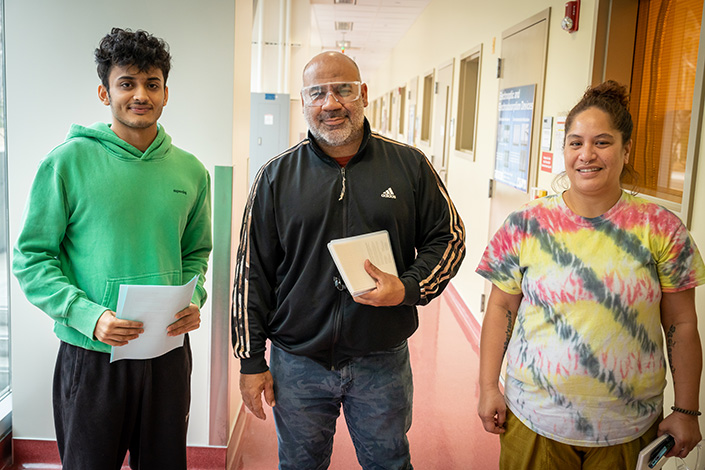
Jacobs School of Engineering undergraduate Chodvadiya stands with trainees Marlon Mendoza, center, and Hauoli Kalui, right, outside the Nano3 cleanroom facility.
The experience has opened up the possibility of a related career for Gavin Ford, a sophomore in business administration at Southwestern whose father served in the military for 20 years. Ford entered the program to explore his curiosity about computers and their inner workings. Now, he is finding connections between his existing interests and nanofabrication techniques like photolithography, a process that makes circuits by using light to create patterns on silicon wafers and other electronic components.
“I feel like I’m learning a lot in a short amount of time, about something I never considered a career path,” said Ford.
For other trainees, like Noconda Le Grand, a former Navy quartermaster and current anthropology major, and Cesar Jacobo, a biology major and veteran’s son, the program’s applications extend beyond the semiconductor industry. Both Le Grand and Jacobo were drawn to the program in part by their jobs and their interest in the products they sell—Le Grand works in sales for Verizon; Jacobo, at Best Buy.
Jacobo wants to bring what he’s learned to a career in solar technology, even as he feels he’s still in the earliest stages of exploring how to do that. Le Grand envisions applying the knowledge he’s gained to a career in archaeology, using new forms of technology to discover sites and artifacts—although adding nanomanufacturing to his skill set also offers him flexibility.
“I think it’s going to be a really great program,” said Le Grand. “This industry is going to be booming.”
Building a Workforce to Meet National Demand
At its core, the Microelectronics and Nanomanufacturing for Veterans Consortium seeks to meet a nationwide need for jobs in semiconductor manufacturing. As a press release from Penn State points out, to meet the worldwide demand for critical semiconductor applications alone, the U.S. needs to add about 5.5% of the global production or 70,000-90,000 fabrication jobs. The global nanomanufacturing-based market and labor needs are estimated to double every three years, according to a report by Eightfold AI.
“We have two types of needs: engineers who can develop new nanofabrication technologies and nanodevices, and technicians who can manufacture such nanodevices to meet industry demand,” said Theriault. “Technicians fulfill the most basic function necessary to fuel that industry, and that’s what we’re training our participants to do.”
The Nano3 training program will host its second cohort of trainees in fall 2023, with the goal of preparing 24 individuals for certification per year. The program will run through 2026.
Learn more about QI’s educational and workforce development programs on the QI website.
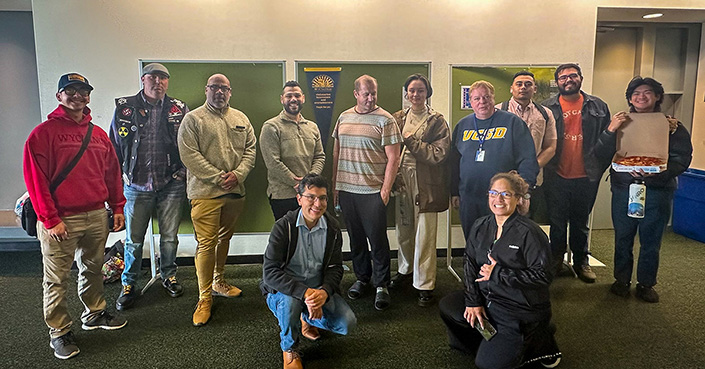
The inaugural cohort of the Nano3 veterans’ workforce training program stands with Yves Theriault (fourth from right) in QI’s Atkinson Hall.
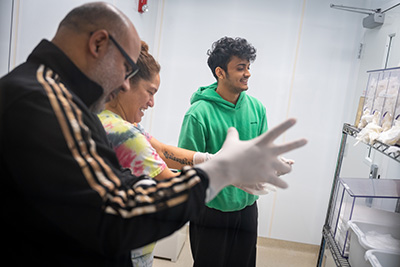
Trainees with the Nano3 veterans’ workforce training program suit up with their undergraduate teaching assistant, Margish Chodvadiya (right, in green).

